| Srl | Item |
| 1 |
ID:
147843
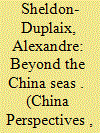

|
|
|
|
|
| Summary/Abstract |
In May 2015, the Information Office of the State Council published a new white paper on China’s military strategy stating that “overseas interests [had become] an imminent issue.” Accordingly, China has embarked on a build-up aimed at making itself into a “sea power,” mainly in the Indo-Pacific region, in order to deter a US intervention in Taiwan and to protect its trade in the Indian Ocean. China has acquired a medium-sized aircraft carrier with a tenth of the capability of a US super-carrier and is learning the ropes as fast as the more experienced and poorer Russia did in the early 1990s. As a source of pride to its citizens, China’s aircraft carrier program plays into the hands of the Communist Party to demonstrate its legitimacy and success. And yet, China has not yet tried to challenge the superiority of the US Navy on the “far seas.” With three or four carriers, China will remain a regional navy with global reach leading India, the UK, and France at that level.
|
|
|
|
|
|
|
|
|
|
|
|
|
|
|
|
| 2 |
ID:
147840
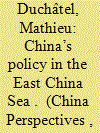

|
|
|
|
|
| Summary/Abstract |
This paper looks back at China’s policy towards the establishment of a crisis management mechanism with Japan in the East China Sea from the beginning of the negotiations in 2008 to the deadlock reached at the end of 2015. During this period of seven years, China moved from being a reluctant negotiator to interrupting the negotiations and finally accepting their resumption, but only after setting such a high bar in terms of relative sovereignty gains that the talks unravelled. The paper argues that the socialisation of China to confidence-building norms in the security sphere – norms that the strategic community of the PRC traditionally rejects – is making very slow progress despite the rising risk of incidents in maritime East Asia. It concludes that Chinese foreign policy uses crisis management negotiations to secure a variety of foreign policy goals linked to sovereignty and balance of power rather than a tool purely dedicated to building security and stability by freezing an existing status quo.
|
|
|
|
|
|
|
|
|
|
|
|
|
|
|
|
| 3 |
ID:
147845
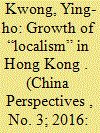

|
|
|
| 4 |
ID:
147842
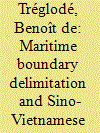

|
|
|
|
|
| Summary/Abstract |
Since the rapprochement between China and Vietnam in 1991, Beijing and Hanoi have always sought to compartmentalise their territorial disputes. As a result, the upsurge of tensions in the South China Sea since 2011 has only affected their bilateral partnership to a limited extent, as the two countries continue to observe the Gulf of Tonkin agreements that were signed in December 2000, establishing their first maritime border in the waters of the Gulf as well as cooperation in matters of fishing, hydrocarbon exploration, and maritime security. This article intends to take stock of the first 16 years of Sino-Vietnamese cooperation in the Gulf of Tonkin, before exploring the potential progress that could represent the current negotiations between the two states regarding the delimitation of the “mouth” of the Gulf, located off the Paracel Islands.
|
|
|
|
|
|
|
|
|
|
|
|
|
|
|
|
| 5 |
ID:
147844
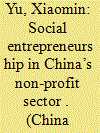

|
|
|
|
|
| Summary/Abstract |
In recent years, civil society organisations in China have increasingly taken entrepreneurial and innovative approaches to enhance their ability to fulfil social missions. How are we to delineate the salient characteristics of non-profits engaging in socially entrepreneurial activities in comparison with their conventional counterparts? Will the emergence of social entrepreneurship in China’s non-profit sector engender new opportunities for grassroots social organisations to overcome the financial and institutional impediments constraining their development? This article tackles these issues through an in-depth case study of a typical social entrepreneurship initiative launched in the process of post-disaster construction after the 5.12 Wenchuan Earthquake in 2008. The findings indicate that socially entrepreneurial non-profits participate in post-disaster reconstruction more innovatively than conventional non-profits in various ways. Nevertheless, they still need to conquer organisational and contextual challenges before evolving into an effective remedy to the development pains of grassroots social organisations in China.
|
|
|
|
|
|
|
|
|
|
|
|
|
|
|
|
| 6 |
ID:
147841
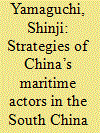

|
|
|
|
|
| Summary/Abstract |
This paper aims to explore the coordination among China’s various maritime actors in the South China Sea (SCS). Since around 2009, China has reinforced its maritime territorial claims in the SCS and has taken coercive measures, including harassing other countries’ vessels and using administrative tools to expand its effective control over disputed islands. One important question is whether China’s tactics are based on a well-coordinated plan or are the unintended consequence of competition and self-interest among the various agencies. This paper shows that, firstly, organisational coordination between these agencies is improving, secondly, that the PLA has a salient role in the operation, and lastly, that the long term trend is important. The paper implies that long-term aspirations are coalescing into more concrete plans under the strong leadership of Xi Jinping.
|
|
|
|
|
|
|
|
|
|
|
|
|
|
|
|